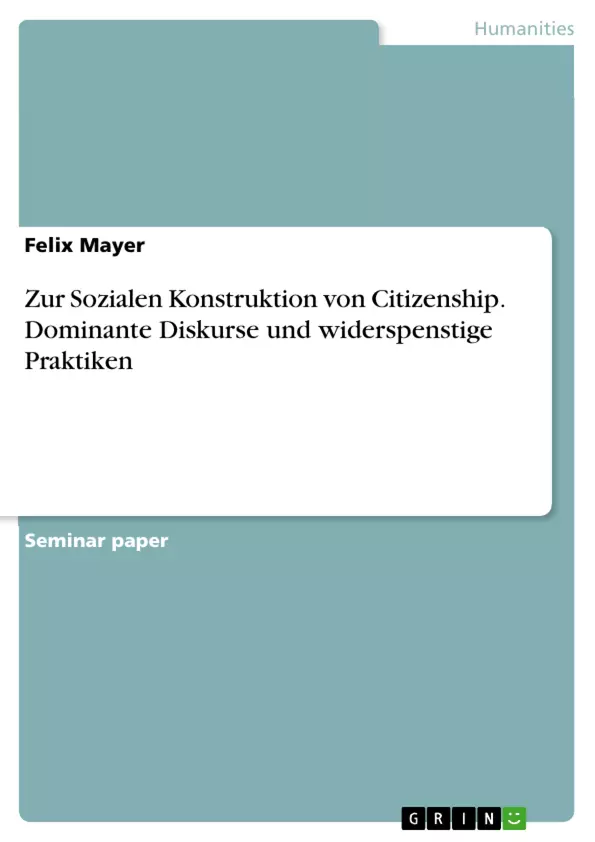Um Anerkennung für ihre eigenen Praktiken der Integration innerhalb der Mehrheitsgesellschaft zu erlangen, beteiligen sich Menschen mit Migrationshintergrund an der sozialen Konstruktion von Citizenship. In Deutschland findet diese soziale Konstruktion auf dem Boden des Integrationsdiskurses satt. Das Wesen eines Diskurses ist es, dass er nicht das Produkt einer/eines einzelnen Autorin/Autors ist, sondern in einem Prozess der Aushandlung zwischen mit mehr oder weniger Macht ausgestatteten Teilnehmer_innen sozial konstruiert wird. Der Begriff des
Integrationsdiskurses liefert deshalb eine gute Folie, unter der die Beteiligung von Menschen mit Migrationshintergrund an der Integrationsdebatte untersucht werden kann. Die Leitfragen dieser Arbeit sind:
1) Wie partizipieren Menschen mit Migrationshintergrund am Integrationsdiskurs?
2) Wie verändern sie das gesellschaftliche Verständnis von Citizenship?
Im Folgenden wird zunächst ein Analysemodell entwickelt, mit dem Diskurse analysiert werden können. Dabei interessiert mich insbesondere, welche Rolle dominante Diskurse sowie Interventionen von mit weniger Macht Ausgestatteten in der sozialen Konstruktion von Citizenship spielt. Anschließend werden verschiedene Studien, die das Engagement von Menschen mit Migrationshintergrund untersuchen, daraufhin analysiert, inwiefern sie Anhaltspunkte dafür bieten, wie diese sich an der sozialen Konstruktion von Citizenship beteiligen. Im abschließenden Fazit sollen die Ergebnisse unter einer Antwort auf die Leitfrage zusammengefasst dargestellt werden.
Inhaltsverzeichnis (Table of Contents)
- Einleitung
- Positionierung im wissenschaftlichen Diskurs
- Der dominante Integrationsdiskurs
- Dominante Diskurse
- Der Integrationsdiskurs
- Widerspenstige Praktiken der Integration
- Transkultureller Aktivismus
- Der Kampf um das Recht auf Differenz
- Reproduktion und Modifikation des dominanten Integrationsdiskurses
- Fazit
Zielsetzung und Themenschwerpunkte (Objectives and Key Themes)
This paper aims to analyze how people with a migration background participate in the social construction of citizenship, especially in the context of the dominant discourse of integration in Germany. The paper will investigate how these individuals negotiate their own practices of integration and influence the understanding of citizenship. The key themes of the paper are: * **Dominant integration discourse:** Examining the dominant discourse of integration and its influence on the understanding of citizenship. * **Widerspenstige Praktiken (Contested Practices):** Analyzing the integration practices of people with migration backgrounds, which are often perceived as segregation. * **Social Construction of Citizenship:** Exploring how people with migration backgrounds actively participate in shaping the concept of citizenship. * **Citizenship Claims:** Investigating how people with migration backgrounds assert their rights and demand full participation in society. * **Transnational Activism:** Assessing the role of transnational activism in shaping the understanding of citizenship and integration.Zusammenfassung der Kapitel (Chapter Summaries)
Einleitung
This chapter sets the stage for the paper, emphasizing the dominance of the integration discourse in discussions about migration. It highlights the lack of attention to the actual practices of integration by people with migration backgrounds. The author introduces the concept of "citizenship claims" and argues for a shift from a solely normative perspective to an analysis of the social practices of citizenship.Der dominante Integrationsdiskurs
This chapter explores the dominant discourse of integration, examining its underlying assumptions and how it shapes societal expectations of people with migration backgrounds. The chapter highlights the normative nature of this discourse, which often dictates specific behaviors and attitudes as prerequisites for full integration.Widerspenstige Praktiken der Integration
This chapter delves into the contested practices of integration, focusing on how people with migration backgrounds engage in cultural practices from their home countries, advocate for minority rights, and participate in transnational activities. These practices are often misinterpreted as segregation, but the author argues that they are integral to their efforts to integrate into society and exercise their citizenship rights.Schlüsselwörter (Keywords)
This paper explores the social construction of citizenship, particularly focusing on the role of migration and integration discourse in shaping the concept. Key themes include: "citizenship claims," "integration practices," "dominant discourse," "contested practices," "transnational activism," and "social construction of citizenship." The paper draws on studies that analyze the engagement of people with migration backgrounds in the debate on integration, their efforts to redefine citizenship, and the impact of their actions on the understanding of belonging and participation in society.How do migrants participate in the construction of citizenship?
People with a migration background participate by negotiating their integration practices and asserting "citizenship claims," which challenge and reshape the dominant societal understanding of belonging.
What is the "dominant integration discourse" in Germany?
It is a normative discourse that dictates how integration should look, often setting specific requirements for migrants to be recognized as full members of society.
What are "contested practices" (widerspenstige Praktiken)?
These are integration practices that might be perceived as segregation by the majority society (e.g., strong cultural ties to the home country) but are actually ways for migrants to exercise their right to difference while integrating.
What is "transcultural activism"?
It refers to the engagement of migrants in social and political spheres that cross cultural boundaries, aiming to gain recognition for diverse ways of living and participating in society.
How does migration change the concept of citizenship?
Migration shifts citizenship from a purely legal or normative status to a socially constructed process of negotiation where participation and recognition are constantly redefined.
What analysis model is used in the paper?
The paper develops a model to analyze discourses, focusing on the role of interventions by those with less power in the social construction of citizenship.



